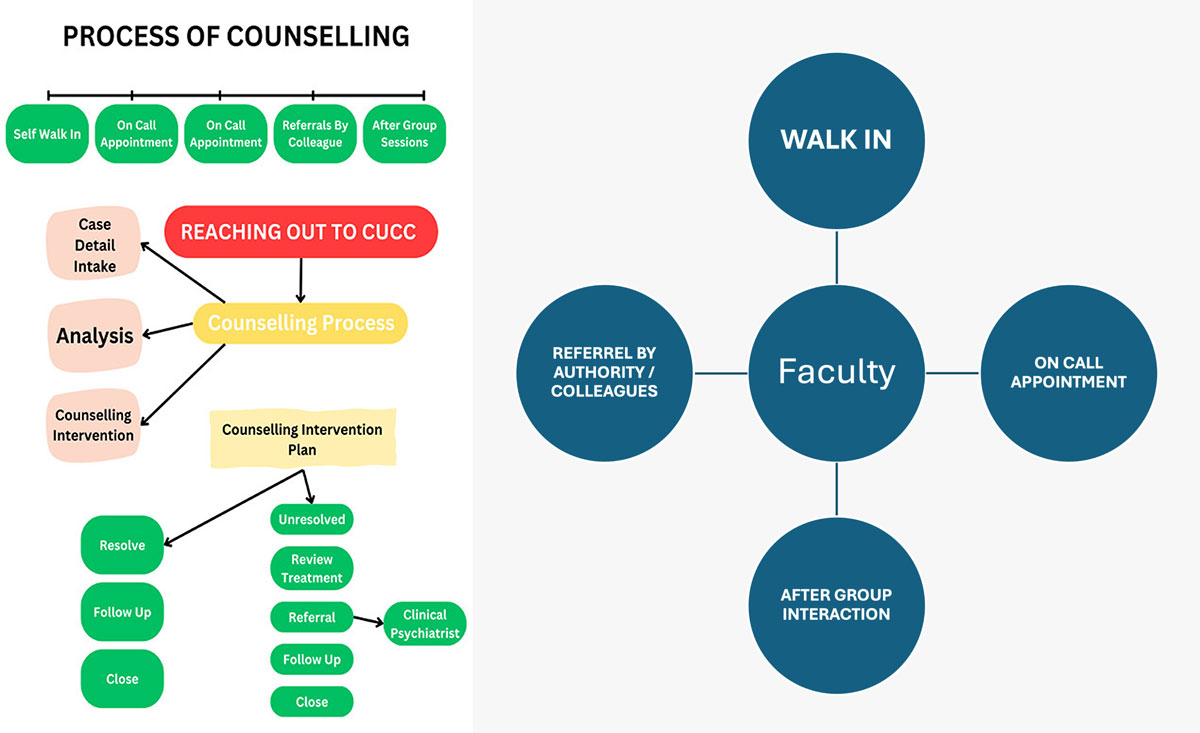This report outlines the counseling services provided to the faculty and staff of Chitkara University. Our services are designed to enhance emotional well-being and mental health among faculty and staff, in line with SDG 3 (Good Health and Well-Being). We implemented both proactive and reactive strategies to effectively deliver our services, resulting in:
Our focus is on proactive and responsive strategies to promote overall mental well-being. We address:
- Personal issues and relationships
- Emotional conflicts and anxiety
- Mental health awareness
- Promotion of work-life balance
- Conflict resolution
- Personal and professional growth
At Chitkara University Counseling Cell, we are committed to supporting our Faculty and Staff by offering individual and group counseling sessions aimed at enhancing emotional well-being and promoting work-life balance.
The Goal of Counseling is to facilitate
- Focus on stress management, conflict resolution, and communication skills.
- Programs to encourage flexibility and wellness activities.
- Organize team-building events to foster a supportive environment.
- To promote work Life Balance.
Individual Counseling Sessions
- A total of 110 individual counseling sessions were conducted, each with a unique ID, addressing various concerns such as anxiety, depression, relationships, adjustment issues, and professional challenges.
- Detailed case information for faculty and staff members is recorded in file FO.
- Evidence-based techniques such as RE-CBT, MBT, and solution-focused therapy have been utilized to address mental health needs.
- When working with faculty, a psycho-spiritual approach has been predominantly applied.
Faculty and Staff Group Sessions
- Numerous group sessions were held on topics including stress management, mindfulness, emotional regulation, self-awareness, resilience in the face of adversity, frustration tolerance, and work-life balance, engaging both faculty and staff.
- Interactive and inclusive methods were employed to cultivate a supportive community and enhance social connections and mental well-being.
- A total of 21 group sessions were conducted, reaching approximately 1,000 faculty and staff members.
Proactive Initiatives
- Conducted sessions for faculty across various departments.
- Collaborated with faculty and staff to create mental health resources and workshops, targeting both faculty and students.
- Organized awareness events and campaigns aimed at reducing stigma and encouraging help-seeking behaviors related to mental health and emotional well-being.
- We ensure outreach to every individual within the university through a digital counseling handbook and standard operating procedures (SOP), allowing prompt access in any emergency situation.
Responsive Services
- Provided confidential individual counseling sessions based on individual needs.
- Offered referrals and connections to external resources for ongoing support in sensitive cases, particularly those involving psychosis, as necessary.
- Compiled daily and consolidated data on counseling cases.
Process of Counseling
- Identifying Concerns: Counseling begins by recognizing the specific issues the individual is facing, which establishes the foundation for support.
- Empathetic Response: The counselor creates a safe and supportive environment, allowing the individual to express their thoughts and emotions freely.
- Guiding Transition: The counselor helps the individual navigate their challenges, facilitating understanding and coping strategies during the transition phase.
- Improving Well-Being: The ultimate goal is to enhance the individual’s mental and emotional health, leading to a more fulfilling and progressive life.
This framework emphasizes the supportive nature of counseling and its focus on personal growth.
Key Achievements
- Increased Awareness: Engaged over 10,550 students and 1,000 faculty and staff through individual and group sessions, as well as the Counselling Handbook, to promote emotional well-being and mental health.
- Early Intervention: Offered timely support to persons through proactive and reactive methods, effectively reducing the risk of mental health issues.
- Capacity Building: Equipped faculty and wardens with skills to identify and assist students facing emotional challenges.
- Faculty Support: Assisted faculty in areas such as self-care, professional boundary setting, communication skills, and mindful leadership in the workplace.
- Collaborative Approach: Created a supportive environment through strategic partnerships with faculty, wardens, and students.
Conclusion
- Our counseling services have made notable progress in enhancing emotional well-being and mental health, contributing to the achievement of SDG 3: Good Health and Well-Being. We are dedicated to continuously improving and expanding our services to support the well-being of our faculty, staff, and students.
- We have promoted a better work-life balance, emphasizing the importance of a safe and non-judgmental space for emotional expression and support.
- We remain committed to providing a confidential and empathetic environment for counseling for our faculty and staff members.
Confidentiality
- We strictly safeguard the confidentiality of all information shared during counseling sessions.
- Our ethical commitment to confidentiality is paramount.
- Cases requiring advanced intervention by psychiatrists are referred for clinical psychiatric care to ensure appropriate assistance.
- All information related to counseling and cases is kept confidential and stored in private records.
WAYS & MEANS TO REACH US FOR FACULTY

